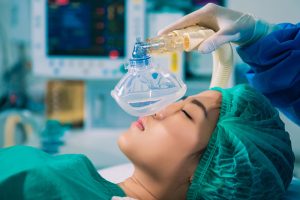I had a great experience, the staff are super nice and very informative. They made sure i was fine and asked if i had any questions, the surgery itself went perfectly smooth. I would recommend them to anyone needing oral surgery. Definitely had a positive experience.
General Information

There are three options available:
- Local Anesthetic
- Intravenous (I.V.) Sedation Anesthetic
- General Anesthetic
Local Anesthetic
The patient remains completely conscious throughout the procedure. Local anesthesia does not diminish an individual’s awareness of pressure, vibration and/or noise associated with tooth removal or the performed surgery. A local anesthetic (lidocaine) is administered in the area where the surgery is to be performed. The patient will be numb and therefore, will not feel pain. If an individual has a badly infected tooth, local anesthetic may be ineffective in eliminating the discomfort. The local anesthetic will generally last for a few hours after the procedure. Local anesthetic is used in all oral surgery procedures. Often times, individuals will have a variety of medical problems, which prohibit the use of local anesthesia alone.
Most commonly, local anesthesia is used as the only form of anesthetic for simple oral surgery procedures:
- Soft tissue procedures
- Basic tooth extractions
Intravenous Sedation Anesthetic
Medications are administered through an intravenous line (I.V.). Intravenous sedative agents are administered to provide relaxation and pain control. Supplemental oxygen is delivered through a nasal breathing apparatus and the patient’s vital signs are closely monitored. Local anesthetic is also used to numb the area. The patient may fall asleep and become completely unaware of the procedure being performed. It is important to understand that this technique does not fully diminish one’s awareness of the procedure. It should be noted that in very anxious individuals, this form of anesthesia can be ineffective. You will need to follow specific guidelines prior to your procedure as directed by your surgeon. See Pre-Operative Sedation/General Anesthetic Instructions
General Anesthetic
This is the most common form of anesthetic that we use at the office. It is very safe and effective.
For a general anesthetic, an anesthesiologist administers medication through an intravenous line (I.V). The patient is in a state of controlled unconsciousness so they are unaware of the surgery and do not feel pain as the surgery is carried out. This anesthetic does require a breathing tube to be placed while the patient is sleeping and is removed before the patient is awake. Local anesthetic is also used to numb the area. You will need to follow specific guidelines prior to your procedure as directed by your surgeon. See Pre-Operative Sedation/General Anesthetic Instructions
How long is the surgery expected to last?
This depends mostly on the nature of the surgery. Your surgeon can best answer this question.
How will I be monitored during the surgery?
Your anesthesia team is personally responsible for your comfort and well-being. Blood pressure, pulse rate, ECG and oxygen levels are some of the important vital signs that are monitored during your surgery.
What emergency protocols are in place in case there is a serious complication?
Our office has the necessary emergency drugs, equipment and protocols in place to care for you in the rare event of a serious complication. Anesthesiologists have the specialized medical training to anticipate and treat complications. All of our nurses and doctors have current advanced cardiac life support training (ACLS) and we frequently rehearse emergency drills. In rare instances, serious complications may arise that require a patient be transferred to a local hospital.
Who will monitor my recovery after surgery?
According to the guidelines established by the College of Physicians and Surgeons, all phases of anesthesia, including recovery should be supervised. Your anesthesiologist, as well as our experienced nurses, will monitor you for your safe recovery. Your vital signs (blood pressure, heart rate, oxygen level, respirations) will be closely observed. You will not be discharged home until you are fit to go, usually within 30 minutes to an hour after surgery.
Will I have any side effects?
The amount of discomfort you experience will depend on a number of factors, especially the type of surgery. With almost all procedures, the patient is given local anesthetic during the procedure so when they wake up they generally are numb in the area. Your doctors and nurses can relieve pain after your surgery with medication given by mouth, by injection or by numbing the area around the incision. Your discomfort should be tolerable and well-controlled. Do not expect to be totally pain-free as some pain is normal after surgery. Nausea or vomiting may be related to the anesthesia, the type of surgical procedure or the post-operative pain medications. Although less of a problem today, because of improved anesthetic agents and techniques, these side effects continue to occur for some patients. Medications to minimize post-operative pain, nausea and vomiting are often given by your anesthesiologist during the surgical procedure and in recovery. You may experience a sore throat and/or nosebleed related to the breathing tube placed under a general anesthetic. This usually resolves quickly.
What can I expect in terms of recovery?
Prior to discharge, the nurses will provide you with post-operative instructions and gauze to take home if needed. The nurse will review these instructions and go over any questions you may have.
Be prepared to go home and finish your recovery there. Patients often experience drowsiness and minor after-effects following ambulatory anesthesia, including muscle aches, sore throat and occasional dizziness or headaches. Nausea also may be present, but vomiting is less common. These side effects usually decline rapidly in the hours following surgery. The majority of patients do not feel up to their typical activities the next day. Plan to take it easy for a few days until you feel back to normal. Know that a period of recovery at home is common and to be expected.
A nurse will call to follow up with you in a few days after your procedure. If you have any questions or concerns, feel free to call the office at any time.


